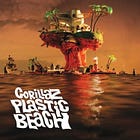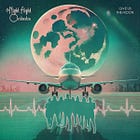Every time I hear “We Will Rock You” at a baseball game or “We Are The Champions” at a championship parade, I can’t help but think of A Night At The Opera. Those stadium anthems wouldn’t be possible without Queen’s best album, and Queen’s best album wouldn’t have been possible if their backs weren’t against the wall. Strapped for cash and facing an uncertain future as a band, it was paramount the quarter came up with something magnificent. And magnificent A Night At The Opera is, a perfect synthesis of Queen’s hard rock origins, their glam rock intentions, and their very, very big future.
True to its title, this album is operatic as all get out. Each track is like a different chapter in one of the most high-flying dramas ever put to recording, starting with a raucous insult to their former manager in “Death On Two Legs (Dedicated To…)”. Freddie Mercury’s voice and Brian May’s Red Special guitar operate like two singing voices, operating perfectly in sync as Mercury throws insults like “sewer rat in a cesspool of pride”. It’s an expressive start and one of the earliest signs the band showed of supersizing their sound. The following “Lazing On A Sunday Afternoon” is a quick change of pace from the venom spit on the previous track, acting as a quick interlude between major moments. It’s a fine tune but not much more.
One of the best parts of A Night At The Opera is how the band feels like one, as opposed to Mercury dominating the entire record. The next three tracks showcase the group’s multifaceted skills, starting drummer Roger Taylor’s ridiculous, heavy “I’m In Love With My Car”. It’s swaggeringly big, effusing love for Led Zeppelin with its instrumental and matching that machismo with Taylor’s performance. It’s followed by one of the purest expressions of love put to a pop recording in “You’re My Best Friend”, written by bassist John Deacon. Mercury apparently hated the Wurlitzer piano that’s prominent throughout the track, but it gives it such unique character, and the aforementioned lyrics are straightforward and sweet. It’s one of my favorite Mercury performances, and the guitar solo at the song’s climax is excellent too.
May’s songwriting contributions that come next give the album further charm. “‘39” is an intergalactic pirate shanty about travelers searching for a new home for their people only to find tragedy when they return. It’s a campfire-esque song with beautiful harmonies around its chorus, bringing the simple story to vivid life. Later on he contributes “The Prophet’s Song”, another sci-fi-inspired track that’s the longest song the band ever produced. It’s heavy prog rock, mystical and magnificent and fully worth the entire 8:20 it takes to finish. If this all sounds like a lot, well, it is, but there’s never a moment that these disparate sounds sound wrong next to each other. It’s usually Mercury’s voice that ties things together, but this is truly the work of a band. Everything on A Night At The Opera is distinctly, unmistakably Queen.
“Sweet Lady” gets back to what a casual listener might expect from Queen, combining Mercury’s distinct vocals with May’s lyrics about a fight between a man and a women. It’s perhaps a little dated lyrically but no less engaging than it was in 1975 when it came out. Then we get back to the opera with “Seaside Rendezvous”, one of Mercury’s jauntiest, most lovestruck tunes ever. The doo wop backing vocals combined with the vaudevillian sound of the song make it unique among a record of unique sounding songs. Fun fact: the instrumental bridge features no instruments, only the voices of Mercury, Taylor and Deacon! And if all that wasn’t enough, the passionate ballad “Love Of My Life” is one of the band’s most covered songs ever. It’s not as creative as many of the other songs here, but makes up for it with the sweet words Mercury sings.
All of this, of course, leads to “Bohemian Rhapsody”, a track that’s been written about extensively and listened to extensively. The unorthodox song structure remains a marvel to this day, and though prog rock songs before this were long and uninviting, everything the band had shown on the previous 10 tracks allows “Bohemian Rhapsody” to soar. The early ballad passage’s nihilistic lyrics about death and murder are still a bit mysterious to this day. The opera in the middle is so gloriously weird and referential that it’s impossible not to sing along. You’ll still headbang to the rock passage that follows, and its ending coda and the continued nihilism of the lyrics bring things to a stunning close. None of this should work, but as shown earlier on the record, there was little the band couldn’t do when creating their masterpiece.
“God Save The Queen” acts as a curtain call for one of the most underappreciated albums of the 1970’s. A Night At The Opera isn’t often mentioned with the likes of London Calling or Physical Graffiti, but when it comes to British rock music of that time, few other albums hold a toast to Queen’s greatest effort. It was a clear vision into the heights that Queen would come to attain, heights that were earned through rigorous, symphonic rock their peers simply couldn’t match.
Verdict: 9.0/10
Check out other posts from my blog:









